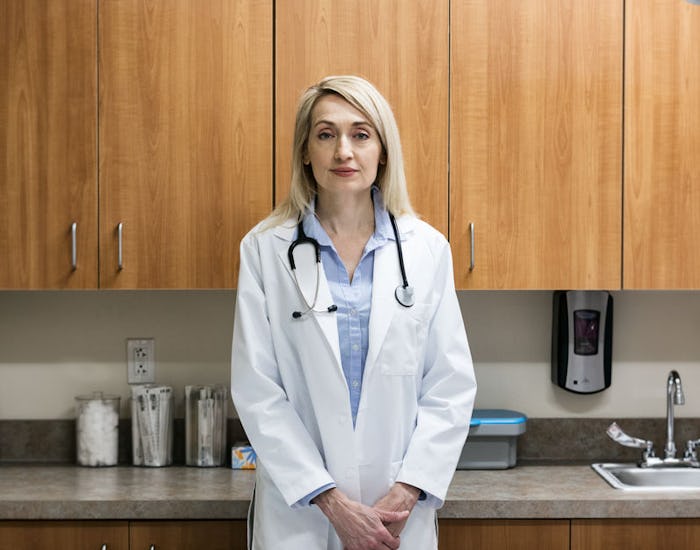Revealing extremely personal information can be difficult even under the best circumstances. But there's one place where it's always important to speak up, and that is your doctor's office. Really, there are some secrets you should never keep from your doctor.
For the most part, honesty is the best way to give your doctor a full overview of your health. "Having an open and honest relationship with your doctor/obstetrician has to be a top priority," says Sherry Ross, MD, OB-GYN and Women's Health Expert at Providence Saint John's Health Center in Santa Monica, CA. "If you don’t feel comfortable with your current obstetrician then you need to find the doctor that gives you that space to talk about all things comfortable and those things not so comfortable to talk about... including your dirty little secrets!" Ideally, you'll feel OK telling your doctor literally anything that pertains to your health. If this doesn't describe your current situation, then there are some ways to find the right doctor for your needs, according to Bustle. For instance, many people value a physician who listens well and devotes time to you personally. Once you're seeing a healthcare pro who clicks with you, then these conversations won't be so difficult.
1Known Food & Drug Allergies
Let your healthcare professional know if you're allergic to anything. "I had a patient who had a HORRIBLE, life-threatening reaction to cancer treatment because of her tree/grass/nut allergy," says board certified osteopathic obstetrician and gynecologist Dr. Octavia Cannon. "She didn't think to tell the oncology team and they didn't ask." Even if it's simply an honest oversight, failing to disclose allergy information can have serious consequences, so don't hesitate to speak up.
2Medications You're Taking
Doctors also need to know the truth about your meds. In particular, it's important to tell a doctor what medications you're currently taking, as well as whether you're taking them as directed, says Dr. Adam Shuster DO (doctor of osteopathic medicine), who is board certified in anesthesiology and pain management. If you're having issues taking any medication as directed, then discuss this with your doctor at once.
3History Of Substance Abuse
Physicians need a complete picture of your health in order to help. This means it's crucial to disclose a history of substance abuse if applicable, says Dr. Shuster. The doctor isn't there to judge. But it's important to disclose this information because of potential drug interactions, as Dr. Cannon explains. It can affect the way your doctor approaches your overall treatment plan.
Understandably, substance abuse and addiction can be difficult topics for many people to discuss. To help broach the subject, learn how to discuss mental health issues with your doctor, including addiction and substance abuse, as explained in Elite Daily. For example, simply planning to discuss your history beforehand may help you mentally prepare for it. If you need more help, then contact the Substance Abuse and Mental Health Services Administration's helpline any time at 1-800-662-HELP (4357).
4Smoking & Other Tobacco Use
This is another time when full disclosure is necessary. "Closet smoking is an issue," says Dr. Ross. "No one really knows how much tobacco a closet smoker actually smokes." This is even more important for people who are pregnant or trying to conceive. "Smoking during pregnancy increases the risk of a low birthweight baby, preterm labor and premature rupture of the membranes," says Dr. Ross. The same goes for other ways of using tobacco, too. Because e-cigarettes are also potentially dangerous for your health, as explained in Johns Hopkins Medicine, tell your doctor if you vape tobacco, too.
5Sexual Preference
In some instances, the doctor may benefit from knowing whether you have sex with males, females, or both sexes. "This info can sometimes determine what tests I perform or help me determine a diagnosis," says Dr. Cannon. If you're not sure whether the doctor needs this much information, then just ask.
6Anxieties About The Doctor's Visit
Does visiting the doctor make you nervous? Voice these concerns. Tell the doctor if you have any fears or anxieties about the visit or a physical exam, says Dr. Cannon. For instance, if it's your first PAP smear ever, or you tend to get lightheaded when getting blood drawn, then let your healthcare professional know. It will make the experience less stressful for everyone.
7Depression Symptoms
Your mental health is important, too. If you've felt depressed for several weeks or months and need help, then tell your doctor, says Ruth Linden, Ph.D., the founder and president of Tree of Life Health Advocates in San Francisco. It could be the first step toward getting a treatment plan that helps your condition. If you need more immediate advice about treatment for depression, anxiety, or related symptoms, contact the Anxiety and Depression Association of America (ADAA) at 240-485-1001.
In the end, it is up to you to disclose whatever you feel like sharing with your medical provider, as it is their responsibility to ask you relevant questions, but it's helpful to keep things in mind.
